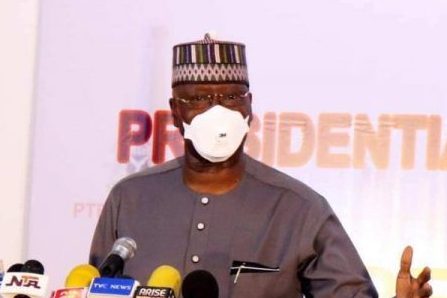CoronaVirus Updates
Nigeria not ready for full reopening of economy, extends lockdown

BY NICHOLAS ABE
The Federal Government says Nigeria is still not ready for full reopening of its economy, hence the extension of the gradual easing of the lockdown of the country by two weeks, from May 18 to June 1.
Chairman of Presidential Task Force (PTF) on COVID-19 and Secretary to the Government of the Federation (SGF), Mr Boss Mustapha, said this during the daily briefing of the task force in Abuja.
According to him, President Muhammadu Buhari took the decision based on the recommendations of the PTF.
President Buhari had on April 27, announced a “phased and gradual easing” of the lockdown in the Federal Capital Territory, Lagos and Ogun states, while declaring a nationwide curfew with effect from May 4.
The President also ordered a ban on all inter-state movements.
Mustapha said: “While some objectives were met, the PTF assessment showed that non-compliance was rampant, but the PTF nevertheless continued to persuade the populace through its messaging and daily briefing, on the need to take responsibility.”
He added that this would be accompanied by a corresponding development of infrastructure and other public health measures to be undertaken in every community and at every phase of the response.
READ: Barber-shops, beauty salons, night clubs remain shut as lockdown eases
According to him, these include: surveillance, case finding, testing, isolation, tracing and quarantining contacts.
“The measures, exemptions, advisories and scope of entities allowed to reopen under phase one of the eased locked down, shall be maintained across the federation for another two weeks effective from midnight today May, 18 2020 to June, 1, 2020.
“Intensifying efforts to tell (communicate), trace (identify) and treat (manage) cases; elevating the level of community ownership of non-pharmaceutical interventions and maintain the existing lockdown order in Kano for an additional two weeks.
“Imposition of precision lockdown in states, or in metropolitan/high-burden LGAs, that are reporting a rapidly increasing number of cases, when the need arises.
“This would be complemented with the provision of palliatives and continued re-evaluation of the impact of the interventions.
“Aggressive scale up of efforts to ensure that communities are informed, engaged and participating in the response with enhanced public awareness in high risk states,” he stated.
He said that the PTF considered it important to let Nigerians know that it relied largely on science, statistics, lessons learnt from other parts of the world and an evaluation of the peculiar circumstances to draw its conclusions on the outcome of the last two weeks.
“For example, our surveillance, infection prevention and control activities identified nine high burden local government areas in the federation reporting high number of cases and accounting for 51 per cent of the total number of infections in the country.
“All the nine are densely populated local government areas nationwide.
READ: Lagos to re-register businesses before reopening economy
“We have also seen that though Nigeria’s caseload still lags behind several other countries, our large population and relatively high degree of mobility and urbanization, 50 per cent, places us at an increased risk for high transmissibility.
“Therefore, our consideration of ease of restrictions has to balance lives and livelihoods and the slow and gradually phased approach should be science and data driven,” he noted.
He said, that in spite of the modest progress made, Nigeria was still not ready for a full reopening of its economy.
“Gradual easing of lockdown is extended by additional two weeks.
“Achieving the foregoing objectives was predicated on adherence to the guidelines issued by the PTF COVID-19, adaptation and cooperation by the states, ownership by communities as well businesses, professional bodies, labour leaders, faith-based organisations, traditional rulers and particularly, individuals taking responsibility.
“The PTF continued to assess the level of compliance with the guidelines which came into effect on May 4, 2020.
“While emphasising ownership, we consistently shared some aspects of the assessment during our daily national briefings pointing in the general direction of non-compliance,” he said.
Reported by NAN
